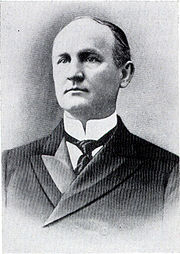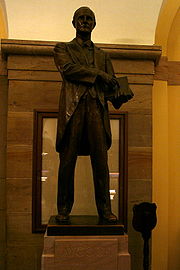
Charles Brantley Aycock
Encyclopedia

Governor of North Carolina
The Governor of North Carolina is the chief executive of the State of North Carolina, one of the U.S. states. The current governor is Bev Perdue, North Carolina's first female governor.-Powers:...
of the U.S. state
U.S. state
A U.S. state is any one of the 50 federated states of the United States of America that share sovereignty with the federal government. Because of this shared sovereignty, an American is a citizen both of the federal entity and of his or her state of domicile. Four states use the official title of...
of North Carolina
North Carolina
North Carolina is a state located in the southeastern United States. The state borders South Carolina and Georgia to the south, Tennessee to the west and Virginia to the north. North Carolina contains 100 counties. Its capital is Raleigh, and its largest city is Charlotte...
from 1901 to 1905. During his tenure as governor, he was an advocate for the improvement of the state's public school systems, and following his term in office, he traveled the country promoting educational causes.
For most of the 20th century, Aycock was treated by historians and North Carolina politicians as an admirable, almost saintly figure. In recent years, that viewpoint is under review, according to a major North Carolina newspaper.
Often overlooked was Aycock's role as a leading spokesman in the white supremacy campaigns of 1898 and 1900, which historians say were marked by widespread violence, voter intimidation, voter fraud and even a coup d'état of the government of Wilmington.
...
The campaigns had far-reaching consequences: Blacks were removed from the voter rolls based on literacy tests, Jim Crow customs were encoded into law, and the Democratic Party controlled Tar Heel politics for two-thirds of the 20th century.
Early life
Charles B. Aycock was born in Wayne County, North CarolinaWayne County, North Carolina
- Cities and towns :*Brogden*Dudley*Elroy*Eureka*Fremont*Goldsboro*Mar-Mac*Mount Olive*Pikeville*Rosewood*Seven Springs*Walnut Creek*Grantham-Geography:According to the U.S...
as the youngest of the 10 children of Benjamin and Serena Aycock. His family lived near the present-day town of Fremont, North Carolina, then known as Nahunta. Though his father died when he was 15, his mother and older brothers recognized his abilities and determined that he should go to college. Aycock attended the University of North Carolina at Chapel Hill
University of North Carolina at Chapel Hill
The University of North Carolina at Chapel Hill is a public research university located in Chapel Hill, North Carolina, United States...
and joined Philanthropic Society, a debate and literary society at the university. After graduating in 1880 with first honors in both oratory and essay writing, he entered law practice in Goldsboro
Goldsboro, North Carolina
Goldsboro is a city in Wayne County, North Carolina, United States. The population was 37,597 at the 2008 census estimate. It is the principal city of and is included in the Goldsboro, North Carolina Metropolitan Statistical Area. The nearby town of Waynesboro was founded in 1787 and Goldsboro was...
and supplemented his income by teaching school. His success in both fields led to his appointment as superintendent of schools for Wayne County and to service on the school board in Goldsboro.
His political career began in 1888 as a presidential elector for Grover Cleveland
Grover Cleveland
Stephen Grover Cleveland was the 22nd and 24th president of the United States. Cleveland is the only president to serve two non-consecutive terms and therefore is the only individual to be counted twice in the numbering of the presidents...
, when he gained distinction as an orator and political debater. From 1893 to 1897 he served as U.S. attorney for the Eastern District of North Carolina
United States District Court for the Eastern District of North Carolina
The United States District Court for the Eastern District of North Carolina is the United States District Court that serves the eastern 44 counties in North Carolina. Appeals from the Eastern District of North Carolina are taken to the United States Court of Appeals for the Fourth Circuit The...
. In 1898 and 1900, Aycock was prominent in the Democratic Party's "white supremacy" campaigns and was elected Governor over Republican Spencer Adams.
Governor
As governor, Aycock became known as the "Education Governor" for his support of the public school system. It was said that one school was constructed in the state for every day he was in office. He was supposedly dedicated to education after watching his mother make her mark when signing a deed. He felt that no lasting social reform could be accomplished without education. He supported increased salaries for teachers, longer school terms, and new school buildings; "690 new schoolhouses erected, including 599 for whites and 91 for blacks."According to John Beck, Wendy Frandsen, and Aaron Randall of Vance-Granville Community College
Vance-Granville Community College
Vance-Granville Community College is a community college in North Carolina serving Vance, Granville, Franklin, and Warren counties. It was established in 1969 by the North Carolina General Assembly as Vance County Technical Institute . VGCC is accredited by the Southern Association of Colleges and...
, "Charles B. Aycock--the same Charles B. Aycock who helped lead the White Supremacy
White supremacy
White supremacy is the belief, and promotion of the belief, that white people are superior to people of other racial backgrounds. The term is sometimes used specifically to describe a political ideology that advocates the social and political dominance by whites.White supremacy, as with racial...
Campaign--is generally considered the state's first progressive
Progressivism
Progressivism is an umbrella term for a political ideology advocating or favoring social, political, and economic reform or changes. Progressivism is often viewed by some conservatives, constitutionalists, and libertarians to be in opposition to conservative or reactionary ideologies.The...
governor. Despite Aycock's unsavory role as a white supremacist, he is still remembered and honored in the state today as the father of public education, and there are few counties in the state where one cannot find a public school named after him."
Later Years and Legacy

United States Senate
The United States Senate is the upper house of the bicameral legislature of the United States, and together with the United States House of Representatives comprises the United States Congress. The composition and powers of the Senate are established in Article One of the U.S. Constitution. Each...
seat held by fellow Democrat Furnifold M. Simmons
Furnifold McLendel Simmons
Furnifold McLendel Simmons was a Democratic member of the United States House of Representatives from 1887 to 1889 and U.S. senator from the state of North Carolina between 1901 and 1931. He served as chairman of the powerful Committee on Finance from 1913 - 1919...
in 1912. But before the nomination was decided, Aycock died of a heart attack while making a speech to the Alabama Education Association in Birmingham on April 4, 1912.
"The subject of Aycock's speech was 'Universal Education'. After he had talked for a few minutes, amidst enthusiastic applause, Aycock spoke the words: 'I have always talked about education -.' Here he stopped, threw up his hands, reeled backward, and fell dead."
In Greensboro, North Carolina, the auditorium at UNC Greensboro, as well as a street, a neighborhood, and a middle school are all named for him. There are dormitories at UNC-Chapel Hill, East Carolina University
East Carolina University
East Carolina University is a public, coeducational, engaged doctoral/research university located in Greenville, North Carolina, United States. Named East Carolina University by statute and commonly known as ECU or East Carolina, the university is the largest institution of higher learning in...
and Duke University
Duke University
Duke University is a private research university located in Durham, North Carolina, United States. Founded by Methodists and Quakers in the present day town of Trinity in 1838, the school moved to Durham in 1892. In 1924, tobacco industrialist James B...
campuses named after him. In Pikeville
Pikeville, North Carolina
Pikeville is a town in Wayne County, North Carolina, United States. The population was 704 at the 2008 census. It is included in the Goldsboro, North Carolina Metropolitan Statistical Area. It is notable as being the home of Collier Motors, an automobile sales and service business established in...
, North Carolina, there is a high school named after him
Charles B. Aycock High School
Charles B. Aycock High School is a public high school in Wayne County, North Carolina, United States, that opened in 1961. The school’s physical address is Pikeville, North Carolina. This area of North Carolina is near the birthplace of Governor Charles Brantley Aycock. During Governor Aycock’s...
as well.
A bronze statue of Aycock by Charles Keck was submitted by the North Carolina Legislature to the National Statuary Hall Collection
National Statuary Hall Collection
The National Statuary Hall Collection in the United States Capitol comprises statues donated by individual states to honor persons notable in their history...
in 1932. The statue is located in the crypt of the capitol building along with other statues from the original 13 colonies.

